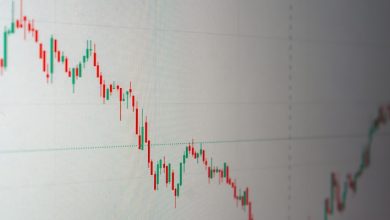The Impact of Economic Factors on Cryptocurrency Investments

- Understanding the relationship between economic factors and cryptocurrency investments
- How inflation and interest rates affect the value of cryptocurrencies
- The role of government policies in shaping the cryptocurrency market
- Market volatility: How economic indicators influence cryptocurrency prices
- The impact of global economic events on the cryptocurrency landscape
- Investing in cryptocurrencies during economic downturns: Risks and opportunities
Understanding the relationship between economic factors and cryptocurrency investments
Understanding the relationship between economic factors and cryptocurrency investments is crucial for investors looking to make informed decisions in the volatile market. Economic factors such as inflation, interest rates, and geopolitical events can have a significant impact on the value of cryptocurrencies. By analyzing these factors, investors can better predict market trends and adjust their investment strategies accordingly.
One key economic factor that influences cryptocurrency investments is inflation. When fiat currencies experience high levels of inflation, investors may turn to cryptocurrencies as a hedge against devaluation. This increased demand can drive up the prices of cryptocurrencies, making them a more attractive investment option.
Interest rates also play a role in shaping cryptocurrency investments. Central bank policies that affect interest rates can impact the cost of borrowing and lending, which in turn can influence investor behavior. For example, if interest rates are low, investors may be more inclined to invest in riskier assets like cryptocurrencies in search of higher returns.
Geopolitical events such as trade wars or political instability can create uncertainty in traditional markets, leading investors to seek out alternative assets like cryptocurrencies. The decentralized nature of cryptocurrencies makes them less susceptible to geopolitical influences, making them an appealing option for diversifying investment portfolios.
In conclusion, understanding how economic factors interact with cryptocurrency investments is essential for navigating the complex and ever-changing landscape of the cryptocurrency market. By staying informed and analyzing market trends, investors can make more strategic decisions that align with their financial goals.
How inflation and interest rates affect the value of cryptocurrencies
When it comes to the value of cryptocurrencies, economic factors such as inflation and interest rates play a significant role in determining their worth. Understanding how these factors impact cryptocurrencies can help investors make informed decisions.
Inflation is the rate at which the general level of prices for goods and services is rising, leading to a decrease in purchasing power. Cryptocurrencies are often seen as a hedge against inflation due to their limited supply. As traditional fiat currencies lose value due to inflation, investors may turn to cryptocurrencies as a store of value.
Interest rates also have an impact on the value of cryptocurrencies. When interest rates are low, investors may seek higher returns in alternative investments such as cryptocurrencies. On the other hand, when interest rates are high, traditional investments like bonds may become more attractive, leading to a decrease in demand for cryptocurrencies.
Overall, it is essential for investors to monitor economic factors such as inflation and interest rates to understand how they may affect the value of cryptocurrencies in the market. By staying informed and adapting to changing economic conditions, investors can make more strategic decisions when it comes to their cryptocurrency investments.
The role of government policies in shaping the cryptocurrency market
Government policies play a crucial role in shaping the cryptocurrency market. Regulations imposed by governments can have a significant impact on the value and adoption of cryptocurrencies. For example, when a government announces a ban on cryptocurrency trading, the market often experiences a sharp decline as investors panic and sell off their assets. On the other hand, when a government introduces favorable regulations that support the use of cryptocurrencies, it can lead to increased investment and growth in the market.
Government policies can also influence the perception of cryptocurrencies among the general public. Positive statements from government officials about the potential benefits of cryptocurrencies can help to legitimize the market and attract more investors. Conversely, negative comments or warnings about the risks associated with cryptocurrencies can deter people from investing in them.
In addition to regulations, government actions such as monetary policy decisions can also impact the cryptocurrency market. For example, when a government decides to print more money or lower interest rates, it can lead to inflation and a decrease in the value of fiat currencies. This, in turn, can drive more people to invest in cryptocurrencies as a hedge against inflation.
Overall, government policies play a crucial role in shaping the cryptocurrency market. Investors should pay close attention to regulatory developments and government actions to make informed decisions about their cryptocurrency investments. By staying informed and adapting to changing government policies, investors can navigate the volatile cryptocurrency market more effectively.
Market volatility: How economic indicators influence cryptocurrency prices
Market volatility in the cryptocurrency space is heavily influenced by various economic indicators. These indicators can provide valuable insights into the overall health of the economy and help investors make informed decisions about their cryptocurrency investments.
One key economic indicator that has a significant impact on cryptocurrency prices is the unemployment rate. When the unemployment rate is high, it can signal a struggling economy, leading to a decrease in consumer spending and investment. This can result in a decrease in demand for cryptocurrencies, causing prices to fall.
Another important economic indicator to consider is the inflation rate. High inflation can erode the value of fiat currencies, making cryptocurrencies an attractive alternative for investors looking to preserve their wealth. As a result, an increase in the inflation rate can lead to a rise in cryptocurrency prices.
Gross Domestic Product (GDP) growth is also a crucial economic indicator that can influence cryptocurrency prices. A strong GDP growth rate indicates a healthy economy with robust consumer spending and investment. This can boost confidence in the cryptocurrency market, leading to an increase in prices.
Overall, understanding how economic indicators impact cryptocurrency prices is essential for investors looking to navigate the volatile cryptocurrency market. By staying informed about key economic indicators and their implications, investors can make more strategic investment decisions and mitigate risks associated with market fluctuations.
The impact of global economic events on the cryptocurrency landscape
The global economic landscape plays a significant role in shaping the cryptocurrency market. Economic events such as recessions, trade wars, and monetary policy decisions can have a profound impact on the value of cryptocurrencies. For example, during times of economic uncertainty, investors often turn to cryptocurrencies as a safe haven asset, driving up their prices. On the other hand, positive economic indicators can lead to increased investor confidence in traditional markets, causing a shift away from cryptocurrencies.
Moreover, global economic events can also influence regulatory decisions surrounding cryptocurrencies. Governments around the world are increasingly looking to regulate the use of digital currencies to prevent money laundering and other illicit activities. Economic downturns may prompt stricter regulations, which can impact the adoption and value of cryptocurrencies.
In addition, the interconnected nature of the global economy means that events in one country can have ripple effects across the cryptocurrency landscape. For instance, a trade dispute between two major economies can lead to market volatility, affecting the value of cryptocurrencies worldwide. Similarly, changes in interest rates by central banks can impact the cost of borrowing and investment decisions, which in turn can influence the demand for cryptocurrencies.
Overall, it is essential for cryptocurrency investors to stay informed about global economic events and their potential impact on the market. By understanding how economic factors can shape the cryptocurrency landscape, investors can make more informed decisions and mitigate risks in an ever-changing market environment.
Investing in cryptocurrencies during economic downturns: Risks and opportunities
Investing in cryptocurrencies during economic downturns can be both risky and rewarding. The volatile nature of the cryptocurrency market means that prices can fluctuate dramatically in response to economic factors. However, these downturns also present opportunities for savvy investors to capitalize on undervalued assets and potentially earn significant returns.
One of the main risks of investing in cryptocurrencies during economic downturns is the increased volatility of the market. Prices can swing wildly in response to news events, regulatory changes, or market sentiment. This can lead to significant losses if investors are not careful. It is important to carefully research and analyze the market before making any investment decisions.
On the other hand, economic downturns can also present opportunities for investors to buy cryptocurrencies at a discount. When prices are low, it may be a good time to invest in assets that have strong long-term potential. By taking advantage of these opportunities, investors can potentially earn significant returns when the market recovers.






